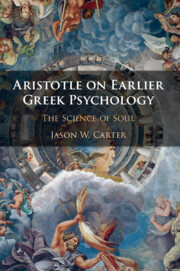Book contents
- Aristotle on Earlier Greek Psychology
- Aristotle on Earlier Greek Psychology
- Copyright page
- Dedication
- Contents
- Acknowledgements
- Abbreviations
- Introduction to Hylomorphic Psychology
- Part I Aristotle’s Methodology of Psychological Inquiry
- Part II Earlier Theories of Psychological Motion
- Chapter 3 Plato’s Psychology
- Chapter 4 Democritus’ Psychology
- Chapter 5 Xenocrates’ Psychology
- Chapter 6 Harmonic Psychology
- Part III Earlier Theories of Psychological Cognition
- Part IV Earlier Theories and Two Psychological Puzzles
- Conclusion: Hylomorphic Psychology as a Dualism
- Bibliography
- Index Locorum
- General Index
Chapter 4 - Democritus’ Psychology
from Part II - Earlier Theories of Psychological Motion
Published online by Cambridge University Press: 08 March 2019
- Aristotle on Earlier Greek Psychology
- Aristotle on Earlier Greek Psychology
- Copyright page
- Dedication
- Contents
- Acknowledgements
- Abbreviations
- Introduction to Hylomorphic Psychology
- Part I Aristotle’s Methodology of Psychological Inquiry
- Part II Earlier Theories of Psychological Motion
- Chapter 3 Plato’s Psychology
- Chapter 4 Democritus’ Psychology
- Chapter 5 Xenocrates’ Psychology
- Chapter 6 Harmonic Psychology
- Part III Earlier Theories of Psychological Cognition
- Part IV Earlier Theories and Two Psychological Puzzles
- Conclusion: Hylomorphic Psychology as a Dualism
- Bibliography
- Index Locorum
- General Index
Summary
- Type
- Chapter
- Information
- Aristotle on Earlier Greek PsychologyThe Science of Soul, pp. 79 - 102Publisher: Cambridge University PressPrint publication year: 2019

